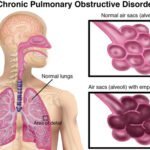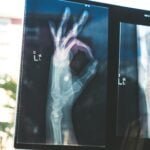
Living with COPD can be challenging, both physically and emotionally. The constant shortness of breath, persistent coughing, and fatigue can leave you feeling frustrated, anxious, and exhausted. Simple everyday activities like climbing stairs or going for a walk can become daunting tasks. However, it’s important to remember that you are not alone in this journey. This article aims to shed light on the various emotions and physical sensations that individuals with COPD may experience, offering support and understanding along the way.
Physical Symptoms
Shortness of breath
One of the most prominent physical symptoms of COPD is shortness of breath. At times, even simple activities like walking or climbing stairs can leave you feeling breathless and struggling for air. This constant sensation of not getting enough oxygen can be quite distressing and impact your overall well-being.
Wheezing
Wheezing is another common physical symptom experienced by individuals with COPD. It is characterized by a high-pitched whistling sound that occurs when you breathe out. This wheezing sound is caused by the narrowing of the airways in your lungs, making it difficult for air to flow freely.
Chronic cough
COPD often presents itself with a persistent and chronic cough. This cough can be productive, meaning it produces mucus, and can be particularly worse in the morning. The cough can be quite exhausting and interfere with your daily activities. It may also make you feel self-conscious about the constant need to clear your throat.
Fatigue
Living with COPD can leave you feeling constantly fatigued. The lack of adequate oxygen supply to your body can cause your muscles to work harder, leading to increased tiredness. The combination of the physical effort required to breathe and the limited physical activity you are able to engage in can leave you feeling drained and depleted of energy.
Chest tightness
Many individuals with COPD describe a sensation of tightness in their chest. This feeling can be uncomfortable and restrictive, making it difficult to take deep breaths. Chest tightness can also contribute to increased anxiety and a sense of being trapped by the disease.
Emotional Impact
Anxiety
The physical symptoms and limitations of COPD can cause a significant amount of anxiety. The constant fear of breathlessness and the unpredictability of exacerbations can lead to heightened worry and stress. Anxiety can worsen symptoms of COPD, creating a cycle of breathlessness and emotional distress.
Depression
Living with a chronic illness like COPD can also lead to feelings of depression. The impact on daily activities, the limitations on social interactions, and the constant struggles with physical symptoms can take a toll on your mental health. Depression can further exacerbate the sense of hopelessness and isolation that COPD often brings.
Frustration
Dealing with the limitations imposed by COPD can be frustrating. The inability to do things you once enjoyed, the need for constant rest breaks, and the challenges in managing symptoms can all contribute to feelings of frustration. It is important to find healthy outlets for this frustration, such as talking to a supportive friend or therapist.
Isolation
COPD can impact your ability to socialize and participate in activities you once enjoyed. This can lead to a sense of isolation and confinement. The fear of exacerbations and the need to prioritize self-care may result in withdrawing from social situations, making it harder to connect with others and maintain relationships.
Fear of exacerbations
Exacerbations, or sudden worsening of COPD symptoms, can be a source of great fear and anxiety. The fear of not being able to breathe and the uncertainty of when an exacerbation may occur can cause heightened stress. Learning to manage and prevent exacerbations can help ease this fear and improve your quality of life.

Impact on Daily Activities
Difficulty in breathing during physical activity
COPD can significantly impact your ability to engage in physical activity. Even simple tasks like walking or climbing stairs can leave you feeling breathless and struggling to catch your breath. This can make physical activity challenging and discourage you from participating in activities that were once enjoyable.
Impaired ability to perform daily tasks
The physical limitations imposed by COPD can also impact your ability to perform daily tasks. Simple chores like cooking, cleaning, or running errands may become more difficult and take longer to complete. This can lead to frustration and a decreased sense of independence.
Low energy levels
The constant effort required to breathe can drain your energy levels, leaving you feeling exhausted and fatigued. This can make it challenging to maintain a consistent level of energy throughout the day and can adversely impact your ability to perform daily tasks or engage in enjoyable activities.
Reduced exercise tolerance
COPD can lead to a reduced ability to exercise and engage in physical activities. This can result in a decrease in muscle strength and overall fitness. Regular exercise is crucial for maintaining lung function and managing COPD symptoms. However, the limitations imposed by the disease can make it difficult to sustain an exercise routine.
Need for frequent rest breaks
Living with COPD often requires frequent rest breaks throughout the day. The constant sensation of breathlessness and the physical effort required to breathe can leave you needing to pause and regain your energy. This can disrupt the flow of daily activities and can lead to frustration at the interruptions.
Sleep Disruptions
Insomnia
COPD can interfere with your ability to get a good night’s sleep, leading to insomnia. The symptoms of COPD, such as coughing, wheezing, and breathlessness, can make it difficult to fall asleep or stay asleep throughout the night. This lack of quality sleep can further exacerbate fatigue and impact your overall well-being.
Restless sleep
COPD can also result in restless sleep. The discomfort caused by breathing difficulties can disrupt your sleep and cause you to wake up frequently throughout the night. This constant interruption of sleep can leave you feeling tired and groggy during the day.
Snoring
Snoring is a common symptom experienced by individuals with COPD. The narrowing of the airways and the increased effort required to breathe can lead to snoring. This not only affects your quality of sleep but may also disturb the sleep of your bed partner.
Waking up frequently
COPD can cause frequent waking up during the night due to symptoms like coughing, wheezing, or shortness of breath. This can disrupt the natural sleep rhythm and result in a fragmented sleep pattern. Waking up frequently can leave you feeling unrested and can impact your overall mood and energy levels.
Daytime sleepiness
The poor quality of sleep caused by COPD can result in daytime sleepiness. The constant struggle to breathe during the night can interrupt the necessary deep sleep stages, making it harder to feel refreshed during the day. Daytime sleepiness can affect your cognitive function, productivity, and overall sense of well-being.

Weight Loss and Malnutrition
Lack of appetite
COPD can cause a loss of appetite, which can lead to weight loss and malnutrition. The constant effort required to breathe can make eating feel like an exhausting task, reducing your desire for food. This can result in inadequate nutrient intake and further exacerbate the physical limitations imposed by COPD.
Difficulties in eating and swallowing
COPD can also cause difficulties in eating and swallowing due to muscle weakness and fatigue. Chewing and swallowing food can become more challenging, making eating a slow and laborious process. This can impact your enjoyment of meals and increase the risk of malnutrition.
Muscle wasting
The combination of reduced appetite and decreased physical activity can contribute to muscle wasting in individuals with COPD. Muscle wasting can further impair physical capabilities and decrease muscle strength, making it even more challenging to engage in daily activities.
Loss of weight
Unintentional weight loss is often experienced by individuals with COPD. The increased effort required to breathe and the reduced appetite can lead to a calorie deficit, resulting in weight loss. Sustained weight loss can have negative effects on overall health and well-being.
Nutritional deficiencies
The difficulties in eating and the limited variety of foods consumed due to poor appetite can lead to nutritional deficiencies in individuals with COPD. Essential nutrients like protein, vitamins, and minerals may be lacking, further impacting physical health and exacerbating symptoms.
Social and Work Impact
Difficulty in socializing
COPD can significantly impact your ability to socialize and engage in social activities. The fear of breathlessness, the need for frequent rest breaks, and the limitations imposed by the disease can make it challenging to participate in social events. This can lead to feelings of isolation and impact your interpersonal relationships.
Impaired work performance
The physical symptoms and limitations of COPD can affect your ability to perform at work. The constant fatigue, difficulty in breathing, and decreased energy levels can result in a decrease in productivity and overall work performance. This can lead to increased stress and potentially impact your job security.
Absences from work or events
Living with COPD may require frequent absences from work or social events due to exacerbations or the need for medical appointments. These absences can make it difficult to maintain consistent work attendance or participate in important personal or social events. The perceived lack of reliability may also impact your self-esteem.
Reduced ability to participate in hobbies
COPD can limit your ability to engage in activities and hobbies you once enjoyed. Physical activities that require exertion may become too challenging or exhausting to pursue, resulting in a loss of interest or participation. This can greatly impact your sense of identity and satisfaction in life.
Dependency on others
The physical and emotional impact of COPD may require you to rely on others for support and assistance. This dependency can leave you feeling vulnerable and can affect your sense of independence and self-worth. Building a network of support and open communication can help alleviate some of these feelings.

Sense of Helplessness
Feeling trapped by the disease
COPD can make you feel trapped and limited by the disease itself. The constant breathlessness, physical symptoms, and need for medical management can create a sense of confinement. It is important to remember that there are still ways to live a fulfilling life with COPD and to seek support and resources to help navigate this sense of helplessness.
Loss of control over one’s body
COPD can make you feel like you have lost control over your own body. The unpredictable nature of exacerbations and the constant need to manage symptoms can lead to a sense of powerlessness. It is crucial to work closely with healthcare providers to develop an effective management plan that empowers you to take control of your health.
Frustration at limitations
The limitations imposed by COPD can be frustrating and can lead to feelings of anger and resentment. It is essential to acknowledge and express these emotions in a healthy way. Engaging in relaxing activities, seeking support from loved ones, or joining support groups can help you manage these frustrations effectively.
Sense of being a burden to others
COPD may make you feel like a burden to your loved ones or caregivers. The need for assistance, frequent medical appointments, and the impact on daily life can create feelings of guilt and inadequacy. Remember that your loved ones are there to support you, and open communication can help address these concerns.
Resentment towards a declining quality of life
Living with a chronic illness like COPD can lead to feelings of resentment towards the decline in your quality of life. Accepting and adjusting to the changes that come with COPD can take time, but finding healthy coping mechanisms and focusing on the aspects of your life that you can still enjoy can help improve your overall well-being.
Financial Strain
Medical expenses
COPD can be financially challenging due to the costs associated with medical expenses. Frequent doctor’s visits, medications, and hospitalizations can add up. It is important to explore available healthcare resources, insurance coverage, and potential financial assistance programs to effectively manage these expenses.
Cost of medications
The long-term management of COPD often requires the use of various medications. The costs of these medications can be a significant financial burden for individuals, especially those without adequate insurance coverage. Exploring options such as generic medications and patient assistance programs can help alleviate some of the financial strain.
Loss of income due to decreased work capacity
Living with COPD can impact your ability to work, resulting in a decrease in income. The physical limitations and frequent absences caused by the disease may lead to a decrease in work capacity or the need to switch to a less demanding job. It is important to explore potential accommodations at work or consider alternative income sources to cope with this financial strain.
Cost of supplemental oxygen or respiratory devices
In some cases, individuals with COPD may require supplemental oxygen therapy or specialized respiratory devices. These devices can be expensive and require ongoing maintenance. Consulting with healthcare providers and insurance companies to understand coverage options and potential financial assistance programs is crucial to manage the financial burden.
Potential need for home care assistance
As COPD progresses, there may be a need for additional home care assistance. This can range from help with daily activities to specialized nursing care. The costs associated with home care services can add to the financial strain. Exploring options such as government-funded programs and community resources can help alleviate some of the financial burden.
Interruption of Intimacy
Impact on sexual activity
COPD can impact sexual activity due to the physical limitations and breathlessness experienced. The fear of breathlessness or exacerbating symptoms may lead to a decrease in sexual desire or performance. Open communication with your partner and healthcare provider can help address these concerns and explore alternative ways to maintain intimacy.
Breathlessness during intimate moments
The physical exertion involved in intimate moments can lead to breathlessness for individuals with COPD. The fear of not being able to catch your breath or feeling self-conscious about the wheezing sounds can result in a decrease in sexual pleasure and satisfaction. Experimenting with different positions or strategies that minimize physical effort can help manage these challenges.
Physical limitations affecting physical intimacy
The physical limitations imposed by COPD can affect physical intimacy. The inability to engage in certain positions or activities due to breathing difficulties or fatigue can impact the overall experience. Open communication with your partner and exploring alternative ways to be intimate can help maintain a fulfilling relationship.
Decreased libido
COPD can also lead to a decrease in libido or sexual desire. The physical and emotional impact of the disease, combined with the presence of symptoms like fatigue and breathlessness, can contribute to this decrease. It is important to have open and honest communication with your partner about these changes and to explore ways to maintain intimacy in your relationship.
Psychological impact on self-esteem and body image
COPD can have a psychological impact on self-esteem and body image. The physical changes caused by the disease, such as weight loss or muscle wasting, can affect how you perceive yourself. It is essential to focus on your strengths, engage in activities that make you feel good, and seek support from loved ones or therapists to address the psychological impact.
Coping Strategies
Medication adherence
Adhering to your prescribed medication regimen is crucial in managing COPD symptoms and improving your overall well-being. Following your healthcare provider’s instructions, taking medications as prescribed, and attending regular check-ups are important steps to effectively manage your COPD.
Pulmonary rehabilitation programs
Participating in pulmonary rehabilitation programs can greatly benefit individuals with COPD. These programs include a combination of exercise training, breathing techniques, and education about managing COPD. Pulmonary rehabilitation can help improve lung function, build endurance, and enhance your overall quality of life.
Breathing exercises and techniques
Learning and practicing specific breathing exercises and techniques can help manage COPD symptoms. Techniques like pursed-lip breathing and diaphragmatic breathing can improve airflow and help you feel more in control of your breath. Working with a respiratory therapist or attending breathing exercise classes can support your COPD management plan.
Emotional support networks
Building emotional support networks can provide a vital source of encouragement and understanding. Connecting with others who share similar experiences can help alleviate feelings of isolation and provide helpful coping strategies. Support groups, online forums, and therapy sessions can all serve as valuable resources in managing the emotional impact of COPD.
Adaptation of living space for better comfort
Modifying your living space to accommodate your needs can greatly improve your comfort and ease of daily activities. Simple changes like removing clutter, ensuring proper ventilation, and keeping frequently used items within reach can make a significant difference. Occupational therapists can offer guidance on home modifications and assistive devices that can enhance your quality of life.
Living with COPD can present numerous challenges, both physically and emotionally. However, with the right support, management strategies, and a positive mindset, it is possible to live a fulfilling life. Remember to seek support from healthcare professionals, reach out to loved ones, and actively engage in self-care practices to effectively manage the impact of COPD.









